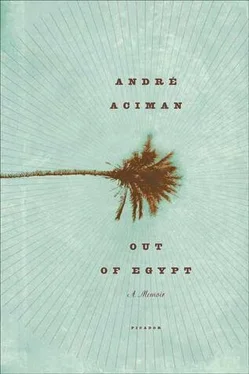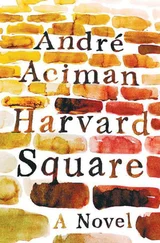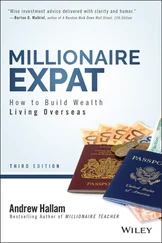The irony behind Uncle Vili’s patriotic histrionics is that, all the while proclaiming his undying allegiance to the fascio, he had already become an agent of British intelligence. His induction as a spy provided him with the only career for which he was truly suited from birth. It also encouraged everyone else in the family to remain in Egypt, especially now that they were plugged into the affairs of not one but two empires.
Vili’s induction into His Majesty’s Secret Service in 1936 coincided with another piece of good fortune for the family: his brother Isaac’s flourishing friendship with the new King Farouk, Fouad’s son. It is not clear how Isaac obtained his appointment as a director at the Ministry of Finance, but shortly after his wedding, he also found himself sitting on the boards of most of the major corporations in Egypt. “Fraterism,” which gives to brothers what nepotism gives to nephews and grandchildren, took care of the rest, so that all of my other uncles — Nessim, Cosimo, and Lorenzo — were offered lucrative positions at several banks in Egypt. Vili’s auction business was thriving; his mother’s apartment overlooking that dazzling expanse of beachfront was given a much-needed sprucing up; Arnaut was born to the Schwab and Marta; and Vili finally made up with his brother-in-law Albert.
At first, Uncle Vili tried to conceal the nature of his new career. Only Aunt Lola and Uncle Isaac knew of it. But secrets of this kind he could never resist divulging, particularly since they stirred everyone’s envy and admiration. It was the closest thing to being a soldier again. He carried a pistol wherever he went and, before sitting down to lunch with the rest of the family, he could often be seen fiddling with and loosening his holster. “What is he,” asked the Schwab, “a gangster now?” “Shush,” Aunt Marta would hiss, “no one is supposed to know.” “But he’s so obvious about it that he must be a decoy. The British couldn’t possibly be that stupid.”
But then, wars are won not because one party is the more resourceful, but because the other is a touch more incompetent. The Italians never suspected that Vili had thrown in his lot with the British and continued to use his services in Egypt and elsewhere. Vili was very often absent from Alexandria, either in Ethiopia with the Italian army, or in Italy, or serving in various Italian delegations to Germany. To become still more vital to Italian interests, he made a name for himself as a transportation expert and as a specialist in fuel distribution for desert convoys. How and where he acquired even a nodding acquaintance with these disciplines is beyond conjecture, but the Italians needed anyone they could get. They took advantage of his flourishing auction house as a cover for his frequent comings and goings between Rome and Alexandria. To allay possible British scrutiny, they encouraged him to import antique furniture, and thus, with the help of the Fascists, he managed to purchase rare antiques at a fraction of their cost in Italy only to sell them to Egyptian pashas for a fortune.
He became very wealthy. With time, not only did there accrue to him the many privileges of an English gentleman spy, but his double life allowed him to enact all those elaborate rituals — from breakfast to nightcap — he had always secretly envied the English, while gratifying his undying Italian patriotism whenever he heard the Fascist anthem, or when the Italians — not without German help — finally scored a victory against the Greeks. “We’ve taken Greece,” he suddenly shouted one day, hanging up the telephone with what must also have been Turkish glee in his voice. “We’re finally in Athens”—whereupon everyone at home jumped up and down, stirring up the Egyptian servants and maids, who would ululate at the slightest pretext for celebration, until someone inevitably sobered up the festivities by voicing concern for Greek Jewry.
Vili’s voice had quivered with excitement at the news, as it did when a group of Italian frogmen stole into the harbor of Alexandria, causing serious damage to two British battleships. Vili was thrilled by the valiant frogmen, but totally disheartened when reminded that he had to condemn their mission. “Gone are the old days,” he would say, meaning the days when you always knew who you were and whose side you were on.
Then something happened. Even he could not quite understand it. “Things aren’t going well,” Vili said. When pressed to explain, he would simply say, “Things.” Unnerved by his answers, his sister Esther would try coaxing him: “Is it that you don’t want to say or that you don’t know?” “No, I do know.” “Then tell us.” “It’s about Germany.” “Anyone could have said it was about Germany. What about Germany?” “They’ve been nosing around Libya too much. It just doesn’t bode well.”
A few months later, my Great-aunt Elsa arrived with her German husband from Marseilles. “Very bad. Terrible,” she said. They would not give her an exit visa. Isaac, who had used his connections with French diplomats once to become a French citizen, had to use them again now to arrange for his sister’s immediate safe conduct. Given her complicated status as an Italian married to a German Jew in France, additional measures were needed, and Isaac obtained for her and her husband diplomatic passports bearing the king of Egypt’s seal. Aunt Elsa complained she had lost her shop of religious artifacts at Lourdes and had spent two years in extreme poverty. “That’s where I learned to be a miser,” she would say, as though this mitigated what all knew was a case of congenital avarice.
Hardly a month later, the Schwab’s twenty-five-year-old half sister Flora appeared in the family living room. Marta immediately saw the writing on the wall. “If all these Ashkenazi Jews begin swarming in from Germany, it’s going to be the end for us. The city will be teeming with tailors, brokers, and more dentists than we know what to do with.”
“We couldn’t sell anything,” said Flora. “They took everything. We left with what we could,” she went on. Aunt Flora had come alone with her mother, Frau Kohn, an ailing, aging woman with clear blue eyes and white skin touched with pink, who spoke French poorly and who always seemed to wear a pleading, terrified look on her face. “They slapped her on the streets two months ago,” explained her daughter. “Then she was insulted by a local shopkeeper. Now she keeps to herself.”
For several weeks early that summer, the streets were rife with rumors of an impending, perhaps decisive, battle with the Afrika Korps. Rommel’s forces had seized one stronghold after another, working their way along the Libyan coastline. “There’s going to be a terrible battle. Then the Germans will invade.” The British, Vili said, were totally demoralized, especially after Tobruk. Panic struck everyone. The small resort town of Mersah-Matrouh on the coast near the Libyan border had fallen into German hands. “They hate us Jews more than they despise Arabs,” said Aunt Marta, as though this were totally incomprehensible. Uncle Isaac, who had heard a lot about German anti-Semitism, had put together a terrifying account, made up of rumors and haunting reminders of the Armenian massacre of 1895, which he had witnessed. “First they find out who is Jewish, then they send trucks at night and force all the Jewish men into them, and then they take you to distant factories, leaving women and children to starve by themselves.”
“All you’re doing is scaring everyone, so stop it right now,” said Esther, who, like other members of her family, had witnessed at least two Armenian massacres in Turkey.
“Yes, but the Armenians had been spying for the British for far too long,” protested Vili, who, in this case, sympathized with the Turks, even though he had fought against them on the British and Italian side during the Great War, while Albert, his brother-in-law, who had fought with the Turks against the British, condemned the massacres as barbarous. “The Turks simply had to put a stop to it in the only way they knew how: with blood and more blood. But what have Jews ever done to the Germans?” asked Uncle Nessim. “The way some Jews behave,” Aunt Clara jumped in, “I’d run them out of this world into the next. It’s because of Jews like them that they hate Jews like us,” she said, eyeing her brother Vili, one of whose favorite maxims she had just quoted. “Then, they’re really going to take us away, you think,” interrupted Marta, her voice already quaking. “Don’t start now with the crying, please! We’re in the middle of a war,” said an exasperated Esther. “But it’s because we’re in the middle of a war that I’m crying,” Aunt Marta insisted, “don’t you see?” “No, I don’t see. If they take us away, then they’ll take us away, and that’ll be the end of that—”
Читать дальше












